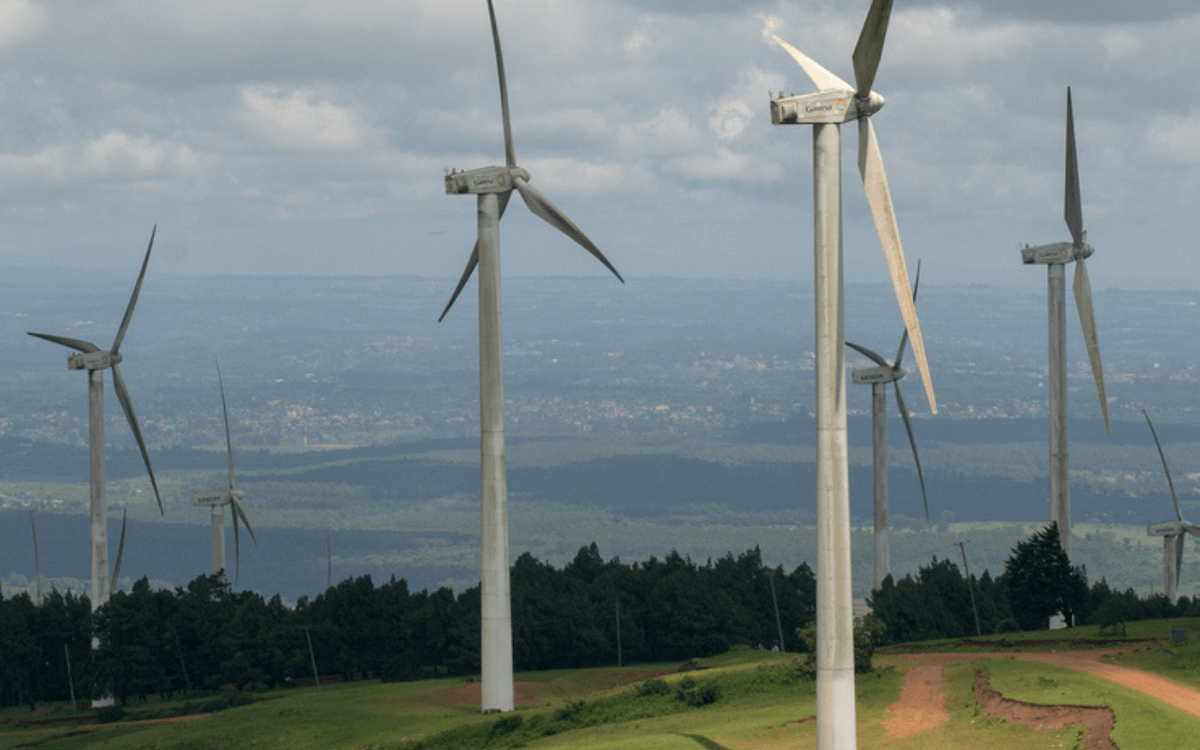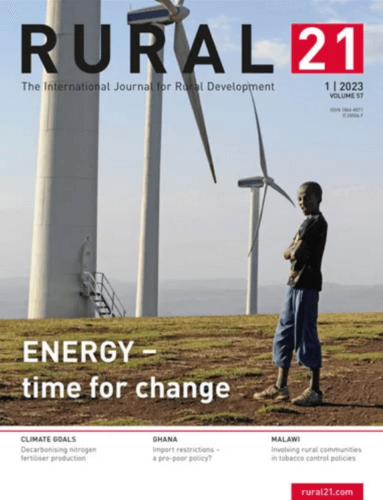Newsletter
Don't miss a thing!
We regularly provide you with the most important news, articles, topics, projects and ideas for One World – No Hunger.
Newsletter
Don't miss a thing!
We regularly provide you with the most important news, articles, topics, projects and ideas for One World – No Hunger.
Please also refer to our data protection declaration.
Africa’s drylands seem to be predestined for generating solar and wind power – especially given the current hype over green hydrogen. However, pastoral communities are often put at a disadvantage in this respect. Our author describes the arising conflicts and what successful coexistence of green energy projects and the communities could look like.


This interview appeared first in Rural21 and is part of a media cooperation between Rural21 and foodfortransformation.org.
According to the 2021 Africa energy review by Price Waterhouse Coopers, since 2013, Africa’s renewable energy capacity has grown by 24 gigawatts, with wind energy and solar power volumes noted to have increased by 14 and by 13 per cent respectively. Renewable power is forecast to grow in Africa from a current 1.79 exajoules to 27.3 exajoules by 2050 – a tremendous increase.
Especially in Africa, more interest in green energy has brought the drylands into the limelight as governments and investors recognise these areas as an excellent site for generating wind and solar power. But the drylands are important livelihood assets for diverse pastoralists peoples, hunter-gatherers and crop farmers, who utilise it as common pool resources. The rediscovery of dryland potentials counters longstanding prejudice that these are wastelands needing to be reclaimed for better economic ventures. The persistent narrative of drylands being “idle” and “empty wastelands” continues to be used to justify land acquisition in the current drive to establish solar and wind power.
While green energy can potentially support the resilience of communities to the changing climate, the disregard with which land is acquired will instead exacerbate their vulnerability.
In most of Africa’s drylands, the tenure rights remain largely communal and not recognised as a legitimate form of land ownership by the governments. As a result, during planning of the energy investment projects, the pastoralist land users are not sufficiently informed about the plans and their own rights, so that they cannot defend them. Lack of recognition and registration of their land ownership also means that communities are denied compensation for the land as well as benefits, except perhaps for a few employment opportunities and some meagre corporate social responsibility projects.
In essence, such acquisition constitutes land grabbing depriving local land users of resources such as pastures and natural energy sources (firewood), and often they are not even granted access to the electricity produced on their own land.
Thus, some green-energy projects have led to land and energy dispossession resulting in reduced access to pastures and interruption of adaptive migration practices, which is the main production strategy in the highly variable environments. This negatively impacts the resilience of the pastoral land-users to the already changing climatic factors.
In most of the countries, the generation of renewable energy has reinforced historical marginalisation of the pastoralists.
Affected communities often try to resist such projects, sometimes violently, resulting in serious conflict, but rather than regarding it as agitation for their rights, governments label such resistance as anti-developmental. This results in project delays and at times even project failures, the consequences being missed economic potentials for the people, investors and the country.
Despite these challenges, there are some recent positive developments in pastoralists’ agitation against green energy projects. In a case in Kenya, against the largest wind power scheme in Africa, the Lake Turkana Wind Power Project, the community successfully challenged land acquisition where the land courts declared the process of acquiring 150,000 acres of land for the wind power establishment illegal. The courts however, did not grant the communities the power to have the company operations suspended pending resolving the land issues.
This is nevertheless an unprecedented and historic victory because it is rare for such small and marginalised communities to have won a legal case against international business firms involved in a project backed by the government.
The case is also instrumental as it sets benchmarks for communities lacking recognised legal claims to their lands and facing similar threats of dispossession. In this case however, with the wind power project complete and already contributing to the national power grid, the extent of benefit or restitution for the community remains to be seen. It can be assumed that with continued increasing interest in land in the rangelands, unless the human rights principles and legal recognition for tenure rights to common land are strengthened, a growing number of pastoralists will lose their land to large-scale renewable energy projects and become poorer.
This is all the more tragic since the United Nations Declaration on the Rights of Indigenous Peoples (UNDRIP) and Convention 169 of the International Labour Organization (ILO) have adopted Indigenous Peoples’ having a say in taking decisions concerning their lives and livelihoods as human rights principles and should really protect them. According to these declarations, governments and investors are expected to use the principles of free, prior informed consent (FPIC) to ensure that the communities understand the proposed project and provide consent in a way that is appropriate to them. But despite these provisions, investors do not provide full disclosure of projects with governments, often compromised by larger economic benefits to the nation, failing to enforce the requirements. For this reason, most companies involved in green energy do not observe FPIC as a form of due diligence and their own human rights policies, particularly in countries that are weak in protecting human rights. According to the Business and Human Rights Resource Centre, out of 50 renewable energy companies surveyed, only five were found to observe FPIC. In Kenya, a country which is not a signatory to the UNDRIP, the above-mentioned Lake Turkana Project did not follow FPIC, citing the flimsy excuse that there are no Indigenous Peoples in the area where the project was established. In reality, the application of FPIC should have been followed regardless of whether or not the communities were identified as Indigenous Peoples.
For just transition to green energy, the customary systems of the communities, including their land tenure, culture and the overall value of their land-use systems, have to be recognised.
With such recognition, the value of the land can be defined in project development as contribution by the communities. This will enable the community benefits to be included in a sustainable way, e.g. as having equity in the project and a community trust that manages the benefits. Such an approach is exemplified by the Kipeto Wind Power Project in Kenya (see Box on page 35), which provided annual lease payments to landowners for land where turbines were erected, an annual share of gross revenue from each wind turbine, and a five per cent equity to the community and revenue share managed by a community trust.
Further, coexistence of the pastoral communities and green energy projects is an important possibility that needs to be explored before exclusions are decided on.
The trade-offs between producing energy and producing food can guide designing of co-existence between the two.
This involves minimising the area of land used for green-energy installations and allowing land use for grazing livestock and crop farming. This multifunctional land use approach, where for instance the space below and between solar panels or wind turbines can be used for grazing of livestock or harvesting of other natural products, can provide a win-win situation resulting in higher overall economic efficiency. Grazing under solar panels can improve animal welfare, which is all the more relevant as climate change leads to higher temperatures. Regarding solar versus wind power, the former is more challenging for livestock grazing unless it is mounted at a height providing ample space for grazing underneath. However, adjusting the designs and raising the panels adds to the investor’s costs of the solar installation, but the benefits from the dual use of land may compensate for these extra costs, particularly in areas of high grazing value.
While positive examples of coexistence from Africa are difficult to come by, a number of opportunities have been observed in other continents. For instance, field experiments in Brazil showed that grazing animals preferred shade from solar panels to shade from cloth, while ranchers in the United States and Australia observed livestock gathering in the shade of wind turbines. Also, in several countries in Europe, animals are grazed on land accommodating wind and solar installations, which provide shade protecting livestock against intense solar radiation while offering society a low-carbon energy source and additional income for the farmers with rights to the land. One further benefit of raised solar panels could be that water used to clean the panels would not be wasted but could drip to the ground and irrigate (albeit in a small way) the vegetation below. Although these coexistence examples are enlightening, they may not be relevant for pastoral areas in Africa, where much of the land is common property with overlapping use rights held by different user groups. However, from the perspective of the possibilities of multifunctional land use, the example serves a good learning point.
There is therefore a need for inclusive participatory design of energy projects to support primary functions of the land to produce food and to provide other services such as conserving biodiversity, supporting rural economic activities in addition to generating electricity.
Towards ensuring this inclusive approach, there is need for the tenure rights of the traditional users of the commons to be recognised within policy and legal governance systems. For instance, a number of countries such as Kenya, Uganda and Tanzania have put in place legal frameworks for the recognition and registration of communal tenure rights. However, the implementation of the said laws has not been adequate to prevent unlawful dispossessions by other land uses.
Zudem bedarf es staatlicher Maßnahmen zur Förderung von gemeinschaftlich betriebenen und verwalteten kommunalen Energieprojekten, die sowohl für die lokale Energieerzeugung als auch für die Einspeisung in das landesweite Netz sorgen.
Energy companies and investors have to adhere to global standards and international agreements that have already been developed, such as the UN Guiding Principles on Business and Human Rights, the International Finance Corporation Performance Standards on Environmental and Social Sustainability (World Bank) and the Voluntary Guidelines on the Responsible Governance of Tenure of Land, Fisheries and Forests (VGGT) of the UN’s Food and Agriculture Organization (FAO), among others. These standards advocate for the recognition of the local communities’ rights, applying the FPIC principles and recognising their customary systems, including land tenure culture, and the overall value of their land-use systems.
Overall, when the livelihoods are protected and adequate and just compensation is provided where land is acquired for green energy projects, then benefits from such projects can support pastoral livelihoods to withstand crises such as the current droughts, and provide avenues for recovery.